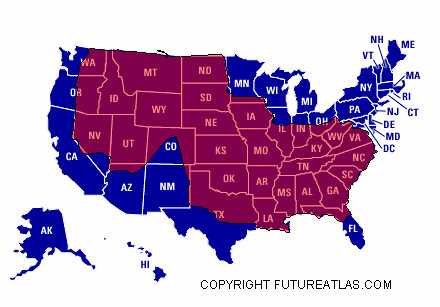
Location: Desk, gloating a bit about George Allen's defeat
Image rights (share with attribution) by futureatlas.com
I can sum up my attitude toward today's Republican Party with some comments left in response to a column by David Brooks of the New York Times. Brooks critiqued the "hyperindividualist" ethos on display at the Tampa GOP convention, but he also critiqued today's Democrats as lacking an agenda. My remarks follow.
My NYT Response
I thought, at one time, that Governor Romney might have offered disenfranchised moderates like me a way back to voting GOP, as I did faithfully for John Warner and other men and women not beholden to the extremists and corporate money.
With the rise of the anti-logic, anti-science, and and anti-everything Tea Party and American Taliban that make up the GOP base today, I suppose it only natural that they'd consume an ambitious man like Romney.
For those like me, who favor both a strong military and strong environmental laws, who consider climate change to be the greatest threat to civilization since the rise of Nazism and the Soviet Bloc, who would confront the Islamists forcefully while fearing any mingling of church and state, what's left?
Certainly not today's GOP. Today's Democrats look, however, more like the GOP I once respected: an agenda to fix our environmental problems, invest in education and research, be forceful but pragmatic in geopolitics.
Where's the lack of agenda there? If Obama has failed--and I fear he has--it has been through the Limbaugh/Rove strategy of blocking everything, even what were once GOP ideas.
The President should have cracked heads, but instead he played the historic role of the nice black man. Pity. We need a head-cracker in such times.
The Way Back to GOP Relevance
So much for what I said in answer to David Brooks. The GOP took a modest pounding, not so much in terms of the popular vote as in their failure to capture increasingly important slices of the voting public: the young, the female, the non-white, the educated, the urban. Today, in USA Today, a disappointed fellow Virginian who is a "prepper" says he plans to stock up on ammunition before Obama outlaws all the guns.
As a fellow firearms owner, I find this laughable. But these same aging white rednecks ran out in 2008 to scoop up so much ammo that stocks ran low.
If the GOP wishes to survive in a changing America, they need to, in no particular order past point one:
- Recognize the existential threat of human-influenced climate change and propose a response, with lots of free-market focuses, on curbing it. Denial is no longer an option.
- Work to enact a Constitutional amendment to undo the People United decision. I have some bitter, better feelings about that one. If I could, I would amend the Constitution to permit only publicly financed campaigns for all national offices. They would begin in October of an election year. Candidates would either be chosen by party-member votes in a nominating convention or in state primaries with a one-month campaign, again publicly financed, before the vote.
- Apply a Libertarian philosophy to social issues that are matters of individual religious beliefs, such as gay marriage or the nutty idea that the earth is only 6,000 years old.
- Champion government support for R&D in new industries and high technology while fighting for on-shore manufacturing that will empower those without college degrees. Modern manufacturing requires advanced skills such as computer programming, so support for our community colleges and vocational schools becomes essential.
- Recognize that fossil-fuel-based "Energy Independence" is a myth that both parties embrace. Wind and solar will never replace dirty fuels in our lifetime. Investment in energy conservation, building a reliable and speedy, if not high-speed, rail net powered by electricity will be a start. Natural gas, produced by the dubious practice of fracking, may buy us 30 years to make a transition to new sources of energy: both candidates talked about 100 years of gas, but clearly they don't read the geologists who write for The Oil Drum.
- Return to principles of small government that empowers small business, not major corporations who reduce payrolls by outsourcing.
- Ramp down the military-industrial complex by mothballing half of the Nimitz-class carriers to replace those that retire after 2020. Aggressively develop AI for unmanned combat aircraft and reserve military force to protect only our most vital interests.
- Reinstate the Glass-Steagall Act, to put a firewall once again between consumer and investment banking.
- Turn away the racists. A tragedy of Virginia politics is that George Allen, the former governor whose racist "Macaca" remark, leading to a revealing YouTube video that cost him his Senate seat in 2006, could once again be nominated to run. He lost, but that Allen would even be considered today shows how bankrupt modern conservative thinking has become.











